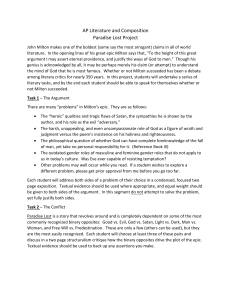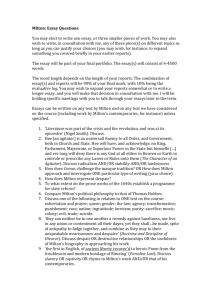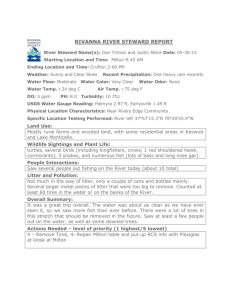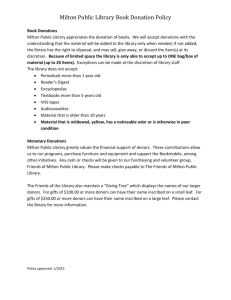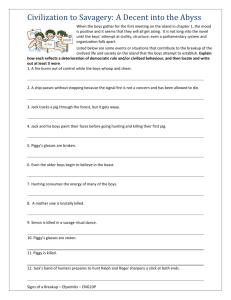(LIT 353) Autumn 2014 Rob Browning
advertisement
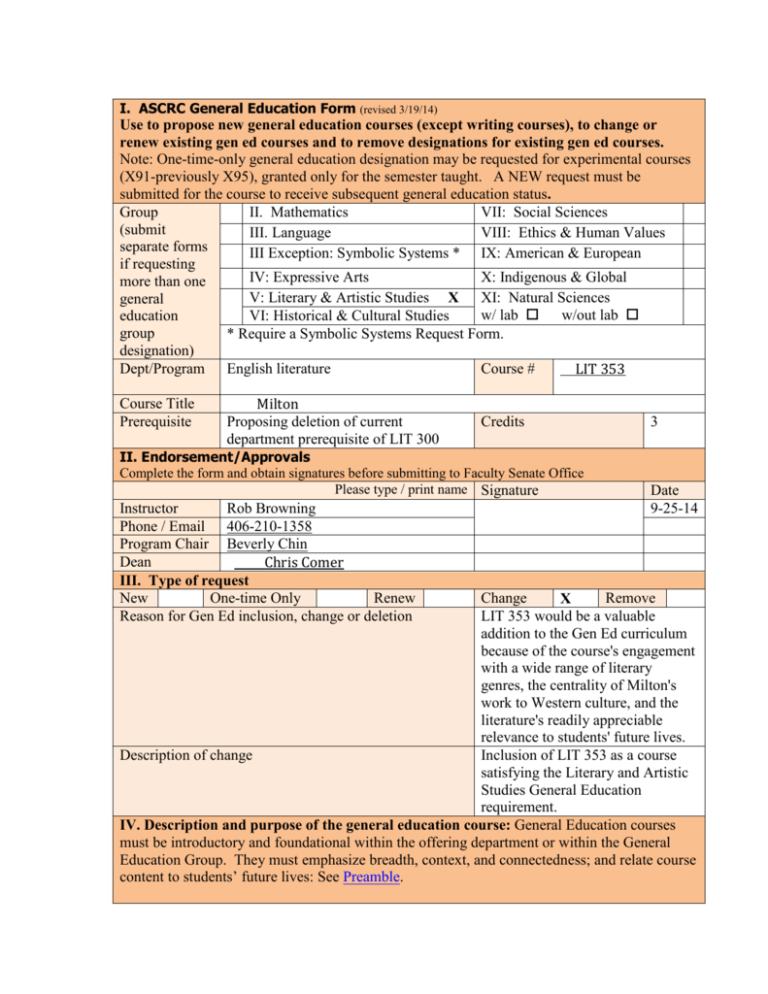
I. ASCRC General Education Form (revised 3/19/14) Use to propose new general education courses (except writing courses), to change or renew existing gen ed courses and to remove designations for existing gen ed courses. Note: One-time-only general education designation may be requested for experimental courses (X91-previously X95), granted only for the semester taught. A NEW request must be submitted for the course to receive subsequent general education status. Group II. Mathematics VII: Social Sciences (submit III. Language VIII: Ethics & Human Values separate forms III Exception: Symbolic Systems * IX: American & European if requesting IV: Expressive Arts X: Indigenous & Global more than one V: Literary & Artistic Studies X XI: Natural Sciences general w/ lab w/out lab education VI: Historical & Cultural Studies group * Require a Symbolic Systems Request Form. designation) Dept/Program English literature Course # LIT 353 Course Title Prerequisite Milton Proposing deletion of current department prerequisite of LIT 300 Credits II. Endorsement/Approvals Complete the form and obtain signatures before submitting to Faculty Senate Office Please type / print name Signature Instructor Rob Browning Phone / Email 406-210-1358 Program Chair Beverly Chin Dean Chris Comer III. Type of request New One-time Only Renew Reason for Gen Ed inclusion, change or deletion 3 Date 9-25-14 Change Remove X LIT 353 would be a valuable addition to the Gen Ed curriculum because of the course's engagement with a wide range of literary genres, the centrality of Milton's work to Western culture, and the literature's readily appreciable relevance to students' future lives. Description of change Inclusion of LIT 353 as a course satisfying the Literary and Artistic Studies General Education requirement. IV. Description and purpose of the general education course: General Education courses must be introductory and foundational within the offering department or within the General Education Group. They must emphasize breadth, context, and connectedness; and relate course content to students’ future lives: See Preamble. In LIT 353 students become familiar with John Milton's most important works in verse and prose. We devote our energies to reading these texts closely and to tracing the development of the author's thinking about certain ideas (creativity, the poet’s vocation, Platonism, monarchy, ritual, the natural word, the sciences, the sexes, marriage, citizenship, the relationship of individual and community) through the course of his career. The course introduces students to a wide range of literary genres (epic, lyric, hymn, masque, sonnet, monody, autobiography, prose pamphlet) and modes (pastoral, heroic, tragic, satiric, elegiac). Through the process of reading this varied literature, discussing it, and writing exploratory essays about it, students become actively engaged in the business of interpreting Paradise Lost, one of the most influential literary texts in the Western canon. The course's primary purposes for students are to strengthen their reading and writing skills, to bolster their confidence as interpreters, and to help them gain an understanding of how Milton's texts remain vitally relevant to our lives today. V. Criteria: Briefly explain how this course meets the criteria for the group. The course introduces students to a wide range of "Courses cover a number of works in one or literary genres (epic, lyric, hymn, masque, more of the various forms of artistic representation; they also establish a framework sonnet, monody, autobiography, prose pamphlet) and modes (pastoral, heroic, tragic, satiric, and context for analysis of the structure and elegiac). Students approach Milton's handling of significance of these works." these genres and modes by way of leaning the history and conventions of each. In the case of epic, for example, we study the basic characteristics of Homer's Illiad and The Odyssey, Vergil's The Aneid, and Beowulf. In the case of masque, we study representative court masques from the early 17th century. In the case of Milton's political pamphlets, we study a range of representative texts from "the pamphlet wars" of the 1640s. 1) to receive instruction on the methods of analysis and criticism In each class, students are introduced to and practice specific analytical methods. These include: analysis of genre according to how a text follows and deviates from established conventions; interpretation of metaphor, allegory, and symbol; analysis of a given work's structure; analysis of the author's selfrepresentations; inter-textual analysis: interpretation of references and aesthetic correspondences; analysis of artistic development in the course of the author's career; inter-arts comparisons; crosshistorical study: consideration of the relevance of a given 17th-century text to our own time. 2) to develop arguments about the works from differing critical perspectives. Students study examples of literary criticism representing a range of critical perspectives. These include: biographical criticism; theological criticism; historicist criticism; feminism; interdisciplinary studies that explore Paradise Lost through the sciences (biology, astronomy), political philosophy, and ecology. VI. Student Learning Goals: Briefly explain how this course will meet the applicable learning goals. 1. analyze works of art with respect to structure This course's texts are especially suitable for and significance within literary and artistic providing students with experience in traditions, including emergent movements and analyzing literary works within artistic forms traditions because Milton was ambitious to make original contributions to each of the major literary genres. Studying a poem such as "Lycidas" involves learning, first, the history and defining characteristics of previous elegies (chiefly from classical antiquity and Milton's own time) and the conventions of the pastoral mode (as exemplified in Vergil's Eclogues and early 17th-century poetry). We analyze the significance of literary form in "Lycidas" by comparing and contrasting it both to contemporary examples and to radical modern examples (such as T. S. Eliot's The Waste-Land), which allows us to think flexibly about this highly innovative text's place in literary history. Our analytical approach to each text we study involves first gaining an understanding of the work's genre and place in literary history; and, second, considering the relevance of the text to the social perspectives and aesthetic sensibilities of our own time. 2. "develop coherent arguments that critique these works from a variety of approaches, such as historical, aesthetic, cultural, psychological, political, and philosophical." Students gain facility in making coherent arguments from different critical perspectives by way of: 1) reading critical studies from a variety of critical perspectives (see V. 2, above) and discussing the validity of these to the literature in class; 2) using these in critical perspectives in short bi-weekly response papers and in a formal, midterm essay; 3) using these in a formal term paper. In addition, students become familiar with the critical arguments of a handful of prominent Milton scholars (C. S. Lewis, Stanley Fish, Barbara Lewalski, Dennis Danielson, and John Forsyth)--in particular, with the coherence of these scholars' typical ways of thinking about Milton. 3. VII. Assessment: How are the learning goals above measured? Please list at least one assignment, activity or test question for each goal. 1. I evaluate the students' analysis of literary structure and their ability to interpret the significance of texts within artistic traditions in their two formal essays (of five and ten pages, respectively). Here are two representative topics for the midterm essay: 1) In the Nativity Ode, what is to be learned about how Milton expresses the expulsion of the pagan gods? First of all, what does it mean in this birthday poem to Christ that the poet devotes so much attention to describing the expulsion? Inseparable from this matter are the aesthetic qualities of the list – the vivid imagery, virtuoso aural effects, and powerful diction (which on the whole seems quite elegiac to me). How are we to understand the emotional and artistic power of this section of the poem? 2) How does A Mask Presented at Ludlow Castle respond to Ben Jonson’s and Inigo Jones’s Pleasure Reconciled to Virtue? Specifically, what does Milton’s mask have to say about pleasure (be sure to explain what you understand this to mean) and its relationship to virtue? In what ways does it challenge and in what ways does it remain constrained by the court masque conventions Jonson and Jones are following? 2. I evaluate the coherence of students' critical arguments in: 1) their class presentation on a focused, critical topic (which must include commentary on a published scholarly article), 2) their two formal papers: one a midterm essay and one a term paper with a research component. The course's requirement of seven written assignments ensures that students are exercising their analytical skills in a variety of critical frameworks. 3. VIII. Justification: Normally, general education courses will not carry pre-requisites, will carry at least 3 credits, and will be numbered at the 100-200 level. If the course has more than one pre-requisite, carries fewer than three credits, or is upper division (numbered above the 200 level), provide rationale for exception(s). I am requesting that the current pre-requisite for LIT 353 --LIT 300--be dropped. The course is listed at the 300-level because of the English department's history of placing single-author courses (including Shakespeare) at this level. The department's current curricular structure reserves the 100 and 200 levels for genre-oriented courses and broad historical surveys. My primary reason for requesting "L" status for LIT 353 is to make the course more accessible and more appealing to motivated non-English majors, who I believe would benefit greatly from satisfying their Literary and Artistic Studies general education requirements with this material. While the course does satisfy the goals for Literary and Artistic Studies and is otherwise in the spirit of the General Education program, the texts it covers are inherently challenging, which makes the 300-level designation warranted. IX. Syllabus: Paste syllabus below or attach and send digital copy with form. The syllabus should clearly describe learning outcomes related to the above criteria and learning goals. Milton (LIT 353) Autumn 2014 Rob Browning e-mail: rob.browning@mso.umt.edu Office hours (LA 217): Tuesdays & Thursdays 10:00-11:00, 1:00-2:00, 3:40-4:30, and by appointment Course summary: In this course students will become familiar with John Milton's most important 0-works in verse and prose. We will devote our energies to reading these texts closely and to tracing the development of the author's thinking about certain ideas (creativity, the poet’s vocation, Platonism, monarchy, ritual, the natural word, the sexes, marriage, the relationship of individual and community) through the course of his career. We will read a selection of critical essays that illuminate some of the perennial debates that have animated Milton studies over the last century or more. Because of its complexity and its prominence in the canons of English literature, Paradise Lost will be our focus for more than half the semester. We will conclude the course with classes on Milton's legacy and the second of C. S. Lewis’s space trilogy novels, Perelandra (1943), which Lewis wrote in concert with his classic A Preface to Paradise Lost (1941). Required texts: The Riverside Milton, ed. Roy Flannagan (Boston: Houghton Mifflin, 1998). ISBN: 0-395-80999-1 Various articles, chapters, and other readings accessible on our course’s Moodle site. I’ll let you know as we go along which of these you should print out and which will be fine to read in electronic form. Graded work: Bi-weekly short essays --------------------------------------------------------Term paper ----------------------------------------------------------------------Shorter formal essay -----------------------------------------------------------Presentation ---------------------------------------------------------------------- 40 30 20 10 Attendance is an indication of your commitment to your studies. I become concerned after a student has missed more than three classes, and expect anyone in this position to see me so we may discuss his or her status in the class. Ordinarily (and certainly if I hear nothing from you), each absence beyond four will reduce the final grade by one third of a letter grade. Please arrive to class on time. I understand that the most conscientious of us sometimes are delayed by circumstances beyond our control (and in those instances, please do come to class rather than not at all). Persistent late arrivals, however, become a distraction for the class. You may dismiss yourself during class time, but please do so only for urgent reasons. Participation: Milton himself deplored mere spectatorship and went to great lengths to entice and provoke his readers to think actively and independently. Our class will be successful to the extent that each of you makes efforts to contribute to our discussions of this controversial literature. My sense of your level of "participation" is based on a number of things: your attendance, how well you appear to be keeping up with the reading assignments (based on your bi-weekly essays and your involvement in discussions), and any conversations you and I have beyond class time. Normally, outstanding participation will raise a final grade by one-third of a letter grade or more; poor participation due to poor preparation and an obvious lack of effort will lower a final grade by one-third of a letter grade. Essays: This course includes three kinds: 1) Bi-weekly response papers are informal, one to two page (single-spaced) explorations of some aspect of a text we have read during the previous week or two. They are due every other Thursday we meet (with a couple exceptions), for a total of five. You should use these papers as an aid to your reading (one typically thinks differently when writing about literature than when reading only) and as a forum for generating interesting questions and topics you might pursue in either of your two formal papers. Otherwise, you have considerable freedom in how you go about these papers. You may revise and build upon a previous paper so long as your revisions are substantial and reflect your engagement with an additional text. I'll distribute topics and prompts for 2) the shorter formal essay at least two weeks in advance of the due date. For this essay (of about five double-spaced pages) you will also have the option of devising your own topic. To earn a grade of “C” or higher, your essay must have a strong, clearly stated thesis—which is to say, a focused claim that requires the work of your body paragraphs to demonstrate. 3) The term paper (of no fewer than ten double-spaced pages) should engage with your chosen primary text(s) and carefully selected critical/theoretical publications. It will be your responsibility to devise a topic for this paper, however, I encourage you to talk with me about your reading and research interests at any point during the semester. Presentation. Either in collaboration with one of your classmates or solo, you’ll be called upon to give a presentation on a specific topic relevant to our reading. Part of this work will entail introducing the class to a scholarly article or portion of a book that bears on the topic. Academic honesty: Plagiarism is a violation of scholarly trust. According to the Provost, “Academic misconduct is subject to an academic penalty by the course instructor and/or a disciplinary sanction by the University. All students need to be familiar with the Student Conduct Code. The Code is available for review online at http://www.umt.edu/SA/VPSA/index.cfm/page/1321.” Violators of the Student Conduct Code will receive an “F” for the offending paper. Each essay you submit must be signed at the bottom of the last page, assuring that the work is your own, except where indicated by proper documentation. Your signature is your word that the essay is free of plagiarism. Accommodation: The University of Montana assures equal access to instruction through collaboration between students with disabilities, instructors, and Disability Services for Students (DSS). If you think you may have a disability adversely affecting your academic performance, and you have not already registered with DSS, please contact DSS in Lommasson 154. I will work with you and DSS to provide an appropriate accommodation. Specific objectives for students of this course: 1. To gain familiarity with the major cultural currents and happenings of the seventeenth century, and to understand how these contexts can contribute to our interpretations of Milton’s works of literature. 2. To learn how Milton works with the conventions of certain literary genres (epic, lyric, masque, and political pamphlet) and how he deviates from these conventions in meaningful ways. 3. To develop your skills in performing meaningful, interesting close readings of literary texts. 4. To gain practice in revising and developing informal response papers into formal analytical essays. 5. To develop your proficiency in writing rhetorically effective essays (well-reasoned and grammatically sound), driven by a thesis and sustained by an ordered, coherent argument. The following schedule is tentative. At the beginning or end of each class I will confirm the reading for the next class. If you ever miss a class, please check with a classmate (or myself) about any schedule changes that may have occurred. 8/26 Tues. 8/28 Thurs. Introductions The Nativity Ode (33-47); Elegy 6, To Charles Diodati (195-97); "Ad Patrem" ("To his Father") (223-27); Shawcross, “The Life of Milton,” pp. 1-6 (on Moodle). 9/2 Tues. "L' Allegro" and "Il Penseroso" (65-77); Prolusion #1, "Whether Day or Night is more Excellent" (846-850). Ben Jonson, Pleasure Reconcil'd to Virtue (Moodle); A Mask Presented at Ludlow Castle (a.k.a. "Comus"), lines 1-330 (Flannagan's introduction begins on p. 109). 9/4 Thurs. 9/9 Tues. 9/11 Thurs. First response paper due. A Mask, lines 331-end. Finish reading Shawcross’s “The Life of Milton” (5-19). "At a Solemn Music" (55-57); Sonnet 18 ("On the Late Massacre") and Sonnet 19 ("When I consider how my light is spent") (254-56); Sonnet 23 ("Methought I saw") (258-59) 9/16 Tues. 9/18 Thurs. Virgil, Eclogue V (link to e-text on Moodle); "Lycidas" (94-107). Second response paper due. “Lycidas,” continued; Womack, “On the Value of ‘Lycidas’” (Moodle). 9/23 Tues. N.H. Keeble, “Pamphlet Wars” (Moodle); Areopagitica, including Flannagan's introduction (987-92, 997-1015). See outline of Areopagitica (Moodle). Areopagitica (1016-24) 9/25 Thurs. 9/30 Tues. 10/2 Thurs. C. S. Lewis, from A Preface to Paradise Lost (Moodle); Paradise Lost, prefatory texts (350354) and book one, lines 1-126. Shorter formal essay due. Paradise Lost, book one (finish); from Neil Forsyth, The Satanic Epic (Moodle) 10/7 Tues. 10/9 Thurs. Paradise Lost, book two Paradise Lost, book three; from Dennis Danielson, Milton's Good God and "Astronomy" (both on Moodle) 10/14 Tues. 10/16 Thurs. Paradise Lost, book four; from Neil Forsyth, The Satanic Epic (Moodle) Third response paper due. Paradise Lost, book four, continued. 10/21 Tues. Paradise Lost, book five; Stephen Fallon, "Paradise Lost and Intellectual History" (Moodle) 10/23 Thurs. Paradise Lost, book six 10/28 Tues. 10/30 Thurs. Paradise Lost, books seven (all) and eight (lines 1-451) Fourth response paper due. Paradise Lost, book eight (finish), book nine, lines 1-781 11/4 Tues. 11/6 Thurs. Election Day—no class Paradise Lost, book nine (finish); Marcia Landy, "Kinship and the Role of Women in Paradise Lost" OR Sandra Gilbert, “Patriarchal Poetry and Women Readers” AND Lewalski, "Milton on Women - Yet Once Again" (all on Moodle) (read Lewalski and either Landy or Gilbert) 11/11 Tues. 11/13 Thurs. Veterans Day—no class Fifth response paper due. Paradise Lost, book ten 11/17 Tues. 11/20 Thurs. Paradise Lost, book eleven; Ken Hiltner, from Milton and Ecology (Moodle) Paradise Lost, book twelve 11/25 Tues. 11/27 Thurs. Milton's legacy (readings to be announced) Thanksgiving Day -- no class 12/2 Tues. 12/4 Thurs. C. S. Lewis, Perelandra C. S. Lewis, Perelandra Term papers are due on December 9 (Tuesday) by high noon. Please slide your essay under my office door (rather than use my department mailbox). Please note: Approved general education changes will take effect next fall. General education instructors will be expected to provide sample assessment items and corresponding responses to the Assessment Advisory Committee.
